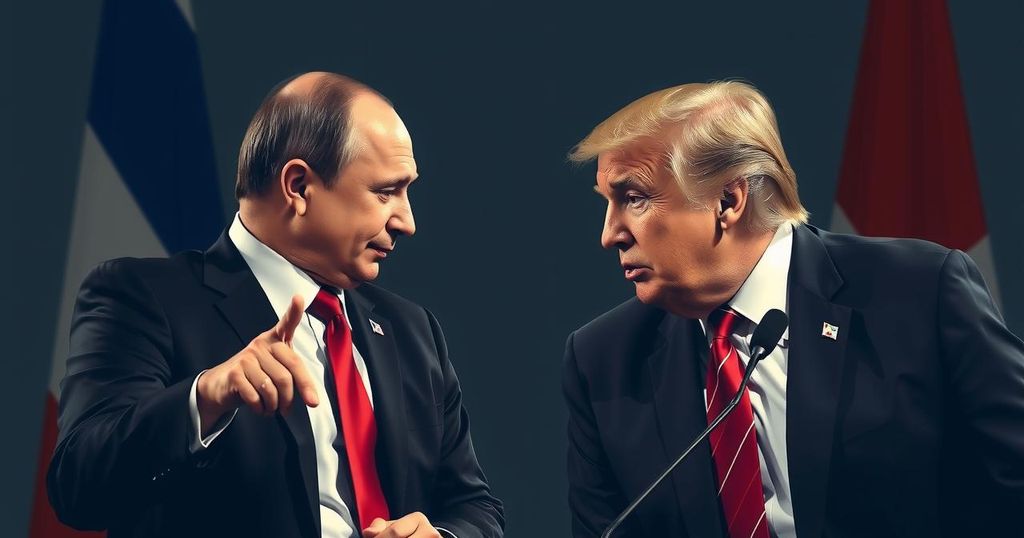Global news
ASIA, BENJAMIN NETANYAHU, DONALD TRUMP, DONBAS, ENERGY INFRASTRUCTURE, EUROPE, EUROPE/ASIA, INTERNATIONAL RELATIONS, ISRAEL, KO, KOMMERSANT, KREMLIN, MILITARY, MOSCOW, NATO, PALESTINIAN AUTHORITY, RUSSIA, RUSSIA-UKRAINE WAR, UKRAINE, US PRESIDENTIAL RACE, VLADIMIR, VLADIMIR PUTIN, VOL, WAR
Leila Ramsay
0 Comments
Putin’s Manipulation of Trump Post-Election: A Geopolitical Analysis
This article examines the implications of Vladimir Putin’s influence on Donald Trump following the latter’s electoral victory, highlighting delayed communications, potential blackmail threats, and Russian misinformation tactics that aim to manipulate the new administration and undermine Western democracies.
In the immediate aftermath of Donald Trump’s electoral victory, Russian President Vladimir Putin appeared to be already manipulating the situation to his advantage. Remarkably, Putin delayed extending his congratulations to Trump for two days, prompting speculation about their relationship as Trump received warm calls from various world leaders. Subsequently, when Trump claimed to have discussed the Ukraine conflict with Putin, a Kremlin spokesperson refuted their conversation, highlighting the complexity and potential disconnect between their communications. As the situation evolves, Putin’s forthcoming military strategies, including the mobilization of additional troops, underscore a potential disregard for personal relations in favor of national interests which Trump must recognize. In a statement by Russian intelligence chief Nikolai Patrushev, it was suggested that Trump indebted himself to certain factions during his campaign, hinting at a compelling expectation that he would now fulfill obligations owed to Russia. This characterization raises serious questions regarding the influence of Russian misinformation campaigns during the election cycle that targeted specific voter demographics. While there remains no evidence of Trump’s direct involvement in these Russian operations, Patrushev’s comments may imply an audacious threat of potential blackmail against Trump, complicating the President-elect’s international standing. Moreover, this scenario serves as a reminder of the broader implications of Russian strategies intended to disrupt democratic processes in Western nations. Trump’s historical inclination towards realignment with Russia indicates a nuanced and potentially fraught path ahead as he navigates foreign policy. His past reliance on Putin over American intelligence assessments raises concerns about the president-elect’s capacity to adapt to a more critical understanding of Russia’s geopolitical aims as he undertakes his second term. It remains to be seen how Trump will respond to the realities imposed by Putin’s ambitions and whether he will reconcile these with the enduring interests of the United States and its alliances. Ultimately, as Trump embarks on this new chapter of his presidency, the onus will be on him to determine the boundaries of U.S. relations with Russia and to draw lessons from the ever-evolving dynamics that challenge his assumptions about friendships in global politics.
The article discusses the delicate political relationship between Donald Trump and Vladimir Putin following Trump’s recent electoral success. Acknowledging Putin’s delayed acknowledgment of Trump’s win, it explores the complexities of their interactions amidst ongoing military tensions in Ukraine. The piece further examines how Russian misinformation tactics during the election campaign might have elicited significant implications for Trump’s presidential approach and his standing in international affairs, especially regarding relations with Russia.
In summary, the events following Trump’s election victory illuminate the intricate and potentially perilous relationship between Trump and Putin. As Trump confronts the realities of global politics, particularly regarding Russian influence and military aggression, he must navigate these challenges with a clear understanding of national interests versus personal relations. The expectations set forth by Russian officials point toward a future laden with complications and precarious negotiations that will ultimately define Trump’s foreign policy agenda.
Original Source: slate.com




Post Comment